Reviews
Howard Hawks
USA, 1941
Credits
Review by Matt Barry
Posted on 03 March 2011
Source TCM
Categories Brackett & Wilder
Compared to his machine-gun paced, rapid-fire comedies like Bringing Up Baby and His Girl Friday, Ball of Fire is actually a bit of a departure for director Howard Hawks. It’s a charming and even whimsical comedy about a group of academics, headed by Professor Bertram Potts, who are compiling an encyclopedia, only to have their solitary, scholarly pursuit interrupted and turned on its head by the arrival of “Sugarpuss” O’Shea, a captivating and conniving girl on the run from gangsters.
Working from a script by Charles Brackett and Billy Wilder, Hawks’ usual brand of sledgehammer, over-the-top comedy is given a calm and even wistful quality that is greatly helped by the performance of Gary Cooper as Professor Potts. He is the perfect foil for Stanwyck’s “Sugarpuss”, imbuing the character with just the right mix of naivete and attraction. Stanwyck gives one of her finest performances, achieving a perfect balance between sexual knowingness and vulnerability that grants her character a strong degree of sympathy. The scene in which she meets the professors for the first time achieves a brilliantly realized tone of comic sexual tension.
The supporting cast adds considerably to the fun, too. The group of professors is played by some of Hollywood’s greatest character actors, including Henry Travers, Tully Marshall (who’d started in films with Griffith), Oscar Homolka, S. Z. Sakall, and Richard Haydn. Dana Andrews has a supporting part in one of his earlier screen roles, and such stalwarts as Dan Duryea, Allen Jenkins, Kathleen Howard, Charles Lane and Elisha Cook Jr. all put in appearances. It’s a virtual who’s who of Hollywood’s character actor talent. Big band drummer Gene Krupa is featured as well, leading a pulsating music number with Stanwyck called “Drum Boogie.”
Stanwyck helps the professors come out of their shells. In one scene, she teaches them to conga after they have unsuccessfully tried working out the dance moves with mathematic equations. There’s a hilarious moment when she kisses Cooper for the first time, having to stack a couple of dictionaries on the floor in order to be able to stand eye-to-eye with him in embrace. It’s really Cooper’s performance that makes these moments work, as he is so completely believable as the innocent, childlike professor. With any other actor in the role, such moments would seem absurd, and the effect would fall flat. Because Cooper is so believable in the part, however, and because Stanwyck comes across so aggressively, such moments are made all the funnier.
Howard Hawks’ comedy films tend to divide viewers. His style was well-suited to the hyperactive screwball comedy, which left little room for the kinds of subtle and sly flourishes of a Lubitsch, say, since the main thrust of the humor tended to be the sharp verbal barbs exchanged by the leading couple (and I maintain that Lubitsch’s comedies were in a markedly different tradition than the out-and-out screwball comedy which flourished during the mid-to-late 30s). There are some deeply touching moments, too, particularly the moment when Cooper pours his heart out about finally being in love for the first time in his life, unaware that Stanwyck is in the same, dark room. When she emerges from the shadows, there is a moment of euphoria when she embraces him, kissing him passionately with just their figures silhouetted against the window. It is a tribute to Wilder and Brackett’s script that these moments manage to be both so touching and effective in what otherwise amounts to a screwball comedy. The tender performance of Gary Cooper brings these qualities of their script to the forefront. Whereas we might laugh in disbelief at the humiliation and discomfort that Katharine Hepburn puts Cary Grant through in Bringing Up Baby, and even at the schemes that Grant pulls on poor Ralph Bellamy in order to get Rosalind Russell back in His Girl Friday, Ball of Fire contains moments that stand out for their depth and heart.
Interestingly, Hawks remade the film himself in 1948 (also for producer Samuel Goldwyn) in a brassy, Technicolor version. This version, titled A Song is Born, benefits from the immense comedic talents of Danny Kaye, but lacks the basic charm and heart that makes Ball of Fire a comedy classic.
More Brackett & Wilder
-
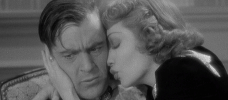
Bluebeard’s Eighth Wife
1938 -
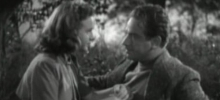
That Certain Age
1938 -

Midnight
1939 -
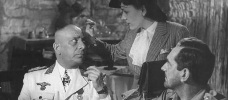
Five Graves to Cairo
1943 -
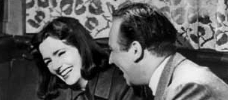
Ninotchka
1939 -
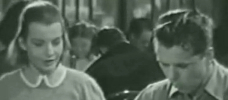
What a Life
1939 -
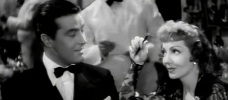
Arise My Love
1940 -
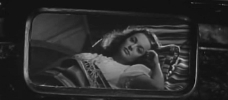
Hold Back the Dawn
1941 -
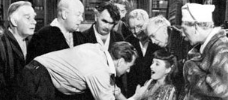
Ball of Fire
1941 -
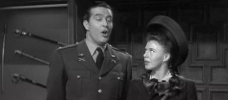
The Major and the Minor
1942 -
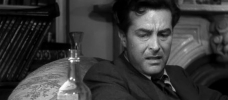
The Lost Weekend
1945 -
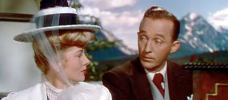
The Emperor Waltz
1948 -
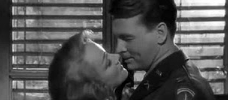
A Foreign Affair
1948 -
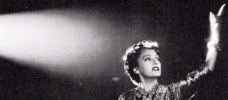
Sunset Boulevard
1950
We don’t do comments anymore, but you may contact us here or find us on Twitter or Facebook.



